#if carter had won in 1980
Explore tagged Tumblr posts
Text

#US Politics#the weight of that sentence kind of hits you like a truck#sometimes I imagine what the world would have been like#if carter had won in 1980
29K notes
·
View notes
Text
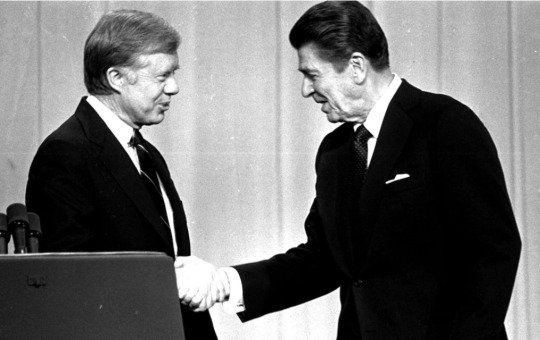
Many consider a contributing factor to the late Jimmy Carter's 1980 presidential election loss to Ronald Reagan was his seeming inability to resolve the Iranian Hostage Crisis, where between 1979 and 1981 Iranian students seized the US embassy and captured 53 members of staff and civilians.
However, just it turned out that Richard Nixon and Henry Kissinger had sabotaged Lyndon B Johnson's peace talks with Vietnam some years previously for political gain, Reagan's allies decided to insert themselves into the Hostage Crisis to aid him the exact same way.
Specifically, former Republican governor of Texas John Connally, who met with leaders in the Middle East in the summer leading up to 1980 election. His goal? Convince the leaders of the various countries he visited to ask the students in the embassy to ignore Carter's attempts to free the hostages, as Reagan would get them a better deal when he won instead.
Carter would go on to loose that election, with voters citing his inability to resolve the Hostage Crisis and a stagnating economy for his loss of support, with the hostages were eventually released on 20 January 1981, the day Reagan took office.
As a Guardian article recounting the statements of Ben Barnes, an assistant to Connally during the 1980 trips, puts it:
“History needs to know that this happened,” Barnes said in one of several interviews with the Times. Barnes said he decided to come forward with his account after news last month that Carter, 98, had entered hospice care at his home in Plains, Georgia, after a series of hospital visits. “I think it’s so significant and I guess knowing that the end is near for President Carter put it on my mind more and more and more,” Barnes said. “I just feel like we’ve got to get it down some way.” Barnes – a Democrat who served as lieutenant governor of Texas and was vice-chair of John Kerry’s 2004 election campaign – told the Times that on returning from the Middle East, Connally reported to the chairman of Reagan’s campaign, William J Casey. “Carter’s aides have long suspected that his campaign was torpedoed by Reagan affiliates who wanted to delay the release of American hostages until after the election,” Axios wrote on Monday. It added: “Ronald Reagan’s subsequent presidency ushered in a conservative era that remains a model for Republicans. If Carter had secured the release of the hostages, he might have won instead.”
34 notes
·
View notes
Text
Americans love to focus on presidential campaigns. The House of Representatives and Senate receive some attention every now and then, but our political love affair tends to center on the race for the White House. When congressional elections gain some attention, it usually happens during the midterms when political junkies don’t have much else to talk about.
But this is a mistake. Congress matters. The outcome of congressional elections during a presidential campaign is crucial to shaping the first two years of an administration, the period when the opportunity for legislating is greatest. In the coming months, the fate of the Democratic Party agenda—regardless of who wins the presidency—will depend as much on how power is distributed on Capitol Hill as who lives at 1600 Pennsylvania Ave.
Even after a mandate election, just one chamber of Congress can be sufficient to check a new president’s agenda. This was the story in 1980. The election was devastating to Democrats. Ronald Reagan, who was a key figure in the modern conservative movement that took hold in the 1970s, promised to move the national agenda sharply to the right after the one-term presidency of Jimmy Carter. And then, for the first time since 1954, Republicans won control of the Senate with a majority of 53 seats.
The saving grace for Democrats that year was the House, where they remained on top. While Reagan defeated Carter in an Electoral College landslide, 489-49, Democrats exited Election Day with a 243-seat majority. Though the number of conservative Democrats had increased, the caucus as a whole was quite liberal compared with the Republicans. Under the speakership of Tip O’Neill, the lower chamber became the last bastion of liberalism. Using this as a base of power, Democrats were able to veto many of Reagan’s boldest initiatives while continuing to push forward their own agenda, even as the chances for passage were minimal.
The impact of a Democratic House was evident in both domestic and foreign policy. Republicans were forced to back away from many of their most ambitious plans to slash the social safety net. When the administration moved to reduce Social Security benefits for early retirees in 1981, O’Neill mobilized a coalition as he warned that the president aimed to dismantle this popular program. Republicans were shaken. Rep. Carroll Campbell was frustrated with the electoral impact: “I’ve got thousands of 60-year-old textile workers who think it’s the end of the world. What the hell am I supposed to tell them?” Democrats also approved a budget that raised taxes, a move that was anathema to Reagan’s acolytes. In 1983, the administration worked with congressional Democrats to shore up the financial strength of the program. The Democratic majority would be bolstered in the 1982 midterms, which took place in the middle of what O’Neill called the “Reagan recession.” The political scientist Paul Pierson showed in Dismantling the Welfare State? the limited progress Reagan made on cutting most major programs.
Similar effects were evident with foreign policy. Reagan’s hawkish posture toward the Soviet Union had been defining as he rose in national prominence during the 1970s. He railed against Presidents Richard Nixon, Gerald Ford, and Carter for practicing the policy of détente, easing relations with the Communists, while ramping up rhetoric against the Soviet Union, calling it an “evil” empire in moralistic terms that presidents had traditionally avoided. He also curtailed negotiations over arms agreements and increased support for anti-communist operations in Central America.
House Democrats responded in force. In 1982, 1983, and 1984, they passed the Boland Amendments, which curtailed Reagan’s ability to provide support to the government of El Salvador and the anti-communist rebels in Nicaragua, the Contras. The global nuclear freeze movement also found strong support on the Hill as a number of members supported resolutions for limitations on nuclear arms production. “I can’t remember any issue, including Watergate, that has moved so many people so quickly,” Democratic operative Robert Squier noted in 1982.
None of this meant that Reagan could not achieve big changes. After all, the president pushed through a massive supply side tax cut in 1981 that made deep inroads into the finances of the federal government and began a path of ongoing cuts that privileged wealthier Americans and business. Scared to oppose him, many House Democrats voted for the cuts of their own accord. Reagan increased the defense budget, and his administration used illegal methods to direct support to Central America. And House Democrats couldn’t stop the enormous impact that Reagan had on pushing national rhetoric toward the right, either. Nonetheless, House Democrats played a pivotal role in restraining conservatism while protecting the liberal legacy of the New Deal and Great Society.
The reverse has also been true. Some congressional elections are extraordinarily dramatic. For all the attention paid to the legendary political prowess of Lyndon B. Johnson, the fact that the 1964 election produced massive Democratic majorities in the House (295) and Senate (68), while shifting the balance of influence within the party away from conservative southerners toward the liberal North, was instrumental to the passage of the Great Society legislation: Medicare and Medicaid, the Voting Rights Act, higher and secondary education funding, immigration reform, and more all became possible because of the size and structure of the Congress that Johnson was able to work with. “The once powerful coalition of Republicans and conservative Democrats appeared to have been rendered impotent, or nearly so,” the New York Times noted in 1964. Once the 1966 midterms revived the conservative coalition of southern Democrats and midwestern Republicans that had ruled Capitol Hill since 1938, Johnson’s window for legislating closed.
Most recently, there was the 2020 election. One of the most important outcomes was Jon Ossoff and Raphael Warnock winning in Georgia, giving Democrats two Senate seats and effective control of the upper chamber. As soon as they won, the Biden administration’s fortunes changed dramatically. With unified control of Congress, Biden’s path to legislative success opened. Although the administration would have to struggle to placate the demands of Sens. Joe Manchin and Kyrsten Sinema, Biden kept his party united enough to move a series of major bills on COVID-19 relief, infrastructure, and climate change. In so doing, he racked up an impressive record.
When Biden was still at the top of the Democratic ticket, one of the greatest sources of concern for Democratic legislators such as former Speaker Nancy Pelosi and Rep. Adam Schiff was that he was making a Republican Congress almost inevitable. Democrats in many parts of the country watched as their polling numbers plummeted.
With the energy and momentum that Harris and her running mate, Minnesota Gov. Tim Walz, have brought to the campaign, the odds for Democrats to win control of the House and possibly the Senate have vastly improved.
As much as Democratic voters will be focused on raising money, canvassing, and promoting their presidential candidate, they would do well to devote as much energy to key congressional races—whether the seats in Long Island that Republicans picked up in 2022 or Senate races in states such as Montana and Ohio.
Johnson always understood how Congress controlled his fate. In 1968, when Treasury Secretary Henry Fowler told the president, “You are the master of the Senate and always have been,” Johnson responded: “I’m not master of a damn thing.” As a veteran of Washington, Johnson always understood that his legacy would ebb and flow based on the composition of the Congress.
This time around, Democratic control of one or two chambers will be pivotal, regardless of who wins. If Donald Trump is reelected as president, congressional power will be essential to impede his inevitable efforts to aggressively deploy presidential power and dismantle the administrative state.
If Harris wins, on the other hand, congressional power will be essential to ensuring that she can use the limited window she would have to expand on and strengthen the legislative legacy of Biden—and to start tackling new issues aimed at exciting an emerging generation of voters.
40 notes
·
View notes
Note
While I generally agree with your writings, I find myself confused by the term "Online Leftist". As a 75-year-old who has had a Social Democratic bent (and because of that has seen more of his votes lose than he ever wished in these United States), I have voted in every county-through-federal level election in my life since age 21. I also use social media sparingly, but I feel I certainly could be considered to be a leftist who is online, but I don't share the viewpoint of those you call "Online Leftist". Please clarify the meaning of that phrase in your writings.
I have to add that I've voted third party only once. I voted for John Anderson in 1980 and instantly regretted that action when Ronald Reagan won. (At that time, Jimmy Carter wasn't perceived as the great humanitarian and climate visionary he truly was, and the economy and the hostage crisis ruled the election arguments.) It was a lesson that was hard-earned. Thus in 2016, even though I supported Bernie Sanders's ideas and philosophy, I voted for Hillary because 1) she had unimpeachable (no pun intended) qualifications, and 2) not to vote for her would ensure that a really nasty and incompetent clown would be leading our country.
Thank you for all of your Tumblr postings. I find myself reblogging them hoping to reach the idealistic voter who tends to want to vote "purist" rather than "pragmatist."
The term "Online Leftists," as myself and others use it, refers to the specific group of often-young, often-white, often-western terminally online social media users, usually on Twitter, who post frothing manifestos about how corrupt the world is (specifically, how corrupt and fascist the Democratic Party of America is) and how the only way to fix it is to have some mythical leftist Revolution that will destroy late-stage capitalism and the current world order and somehow have no bad effects whatever and then a magical "progressive" utopia will spring into existence and everything will be fixed. Even the ones who don't go that far are heavily influenced by the ideology that the establishment/country is corrupt beyond repair, voting (especially voting for Democrats) is morally evil and indefensible, that there is no difference between the political parties of America, and that America/the West is the cause of all evil in the world. It has become especially visible with the Russia/Ukraine and Israel/Hamas wars, when they enthusiastically or at least tacitly support Russia and Hamas simply because those states/groups are "anti-western."
It also has to do with the whopping western leftist levels of virulent antisemitism and eagerness to call Israel a "white western colonialist settler state," as discussed in previous posts. Even while they decry Israel's genocide of Gaza, they will twist themselves into knots to excuse Russia's genocide of Ukraine or any legitimacy to a Jewish state or need for Israel to defend its own civilians, because you see, those genocides are committed by people they like in support of something something, Advancing the Great Revolution Cause. This is partly influenced by the belief that modern far-right fascist Russia is somehow a standard-bearer for old-school USSR socialism (which itself was horrifying enough) and should be defended and cheerled as a principled enemy of the West. This is the same group of people who unironically spend all their time posting fulminations that Biden is a genocidal fascist and America is a dictatorship, because they know that literally nothing will happen to them and they will face no real-world consequences, because none of those things are actually true. But as long as they can claim it for the rhetorical martyrdom, that does not matter.
By political beliefs and presence on Tumblr, I too am definable as a leftist who is online, but the Online Leftists (used together and with capital letters) are a distinct group whose ideology is marked by righteous nihilism, rejection of voting, support for a mythical "Revolution" in place of ever trying to work within the flawed political system, support for violent genocidal states or groups as long as they are "anti-western" or "anti-Israeli" (witness how they flocked to quiveringly defend the Houthis) while simultaneously yelling at everyone else for supporting genocide, making no attempt to incorporate actual politics, history, or reality into their all-consuming ideology, and shaming everyone else who doesn't agree with them. As you say, they are focused on some "pure" level of political engagement, which is of course impossible and therefore means the only thing they do is spend their time on Twitter rampantly spreading misinformation as long as it fits their beliefs. Pragmatism, harm reduction, nuance, or making a flawed choice that puts any kind of "moral burden" on them does not exist to them and is a dirty word, because it might conflict with bringing about La Revolution. So yeah.
114 notes
·
View notes
Text
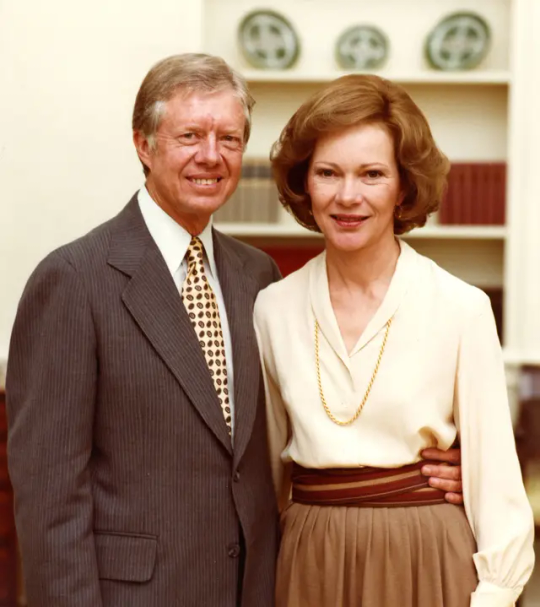
Jimmy Carter
US president whose subsequent decades of tireless humanitarian work brought him the Nobel peace prize
The former US president Jimmy Carter, who has died aged 100, achieved a far more favourable reputation after leaving the White House than he ever secured during his single term of office. Following his electoral defeat in 1980 – when Ronald Reagan beat him by 489 to 49 electoral college votes – his sustained efforts to improve life for the deprived people of the world won him the 2002 Nobel peace prize.
Carter left a mixed heritage from his presidential term. He put human rights firmly on the international agenda, persuaded Congress to cede US control of the Panama canal, demonstrated that peace settlements could be achieved in the Middle East, and completed the second strategic arms limitation treaty with the Soviet Union.
But he was not cut out for the White House. He became the 39th president because he was not Gerald Ford: he was ousted after one term not only because of his administration’s inept handling of the Iranian hostage crisis but because he was overwhelmed by the job.
Carter came into office faced with the continued economic aftermath of the Vietnam war. To meet its burgeoning costs, President Richard Nixon had abandoned the fixed international exchange rate agreed after the second world war and allowed the dollar to float. That immediately imported inflation into the US, exacerbated by the 1973 Yom Kippur war in the Middle East, which provoked Arab oil-exporting nations to quadruple the price of their oil. Carter arrived in Washington with inflation running at 7%. Within 18 months it had climbed to 11.3%.
Oil, which had been $20 a barrel, surged to $107. Carter’s response was to ask the US to curb its profligate use of energy. The plea fell on deaf ears. He then nominated Paul Volcker as chairman of the Federal Reserve Board to deal with the problem. Volcker arrived proclaiming that the US “could not inflate itself out of a recession” and embarked on a ferocious campaign to kill it. The interest figures tell the story: in June 1979 America’s prime rate was 11.5%, by November 15.5%, by March 1980 18.5% and by the end of that year it peaked at 21.5%. During his election campaign Carter had devised what he called the misery index, combining unemployment and inflation. It stood at 13.5 when he was elected. He left the White House with it at 19.9.
He eventually retrieved his reputation by founding the Carter Center in his home state of Georgia and embarking on a vast range of activities designed to defuse international conflict and to introduce democracy and a decent standard of life across the globe.
This took him to countries ranging from Zambia to Peru and from Sudan to Guyana, for such disparate projects as mediating in civil warfare, encouraging sustainable agricultural development, establishing a proper judicial system, or installing a clean water supply. He became a familiar figure at election counts around the globe, part of the international team that sought to ensure that where skulduggery could not be prevented, it was at least well publicised.
With the agreement of the Clinton administration, in 1994 Carter took up an invitation to visit Kim Il-Sung in Pyongyang, and out of their talks came the Agreed Framework, by which North Korea undertook to suspend its nuclear weapons programme in return for increased energy aid from the US. Initial progress was not sustained, and by 2003 relations between the two countries were openly hostile again. In 2008 he was criticised in the US and Israel for urging peace talks involving Syria and Hamas. In August 2010 he returned to North Korea to secure the release of a US citizen, Aijalon Gomes; he visited the country again in 2011, and six years later indicated his willingness to do so once more if called on.
Carter acknowledged that much of the energy he brought to the Carter Center had stemmed from the unexpected frustration of his presidential career. “I don’t think that if I had had two full terms in the White House, I would have launched so ambitious a new career. I would probably have become a professor and written some books.”
Born in Plains, Georgia, Jimmy (James) was the eldest of four children of Lillian (nee Gordy), a nurse, and James Carter, a peanut farmer. He planned a naval career, graduating from the US naval academy in 1946. Then he became involved in the design and development of nuclear power for ships, and later with training seamen to serve in them. This was apparently when he acquired his dogged interest in organisational and functional minutiae.
In 1953, however, the death of his father obliged him to resign his commission to take control of the family business. This sparked an interest in politics and, in 1962, he was elected a state senator. At the end of his four-year term, he ran unsuccessfully for the governorship of Georgia. In 1970 he was elected at his second attempt and began to plan his presidential campaign.
His ambitions coincided with the Watergate scandal and the enforced resignation of Nixon in August 1974. Ford, a Republican congressman from Michigan, had been hand-picked by the beleaguered incumbent as his successor. The electorate, initially neutral about the constitutional niceties of this procedure, erupted in fury when the newly sworn-in President Ford announced an unconditional pardon for his patron. The stage was thus set for Carter’s bid, on the basis that he did not belong to the Washington establishment and that he espoused the simple moral and religious values that the electorate was then seeking.
In the 1976 primaries he easily outpaced his Democratic rivals. But his presidential victory was uncomfortably narrow: he won only 23 of the 50 states and secured less than half the popular vote (excluding Washington DC). His arrival in the White House arose more through the quirks of the electoral college, where he predominated by 297 votes to Ford’s 240. His election showed plainly what became even more starkly evident as his term progressed: that support in the country was marginal and could be eroded by almost any setback. The honeymoon lasted long enough domestically to get the Panama canal treaties ratified in 1978 – no small achievement – and internationally to bring Israel and Egypt to a widely applauded peace settlement in 1979, brokered by Carter.
But the very nature of his electoral campaign quickly rebounded on him. He chose to emphasise the shift from previous administrations by appointing a group of inexperienced assistants to senior posts. Within a short space of time, his budget director, Bert Lance, was forced to resign amid allegations of impropriety – charges that sat ill with Carter’s repeated emphasis on probity. His chief of staff, Hamilton Jordan, became notorious for his poor handling of influential figures on Capitol Hill, a vital factor for any administration, but even more critical in the post-Vietnam, post-Watergate climate in Washington.
Congress, in its own eyes, had been bulldozed into the expansion of the Vietnam war by Lyndon Johnson, grossly affronted by Nixon’s constant claims of executive privilege and eventually by his illegalities, and circumnavigated by Ford’s accession. It had fettered the White House with the War Powers resolution of 1973 and came within a whisker of impeaching the president. It was singularly unimpressed by the arrival of a man whose experience was as a one-term southern governor.
It might have been easier had Carter arrived with a clear political agenda, but he seemed geared to the politics of symbolism rather than substance. In an effort to focus his compatriots’ attention on their profligate use of energy, he addressed the nation wearing a woollen cardigan, which simply drowned the message in derision. His national energy policy was barely recognisable by the time it emerged from Congress.
The international community also found itself with problems caused by the amateurism of the White House. Within six months of taking office, Carter requested funds to develop neutron warheads for missiles deployed in Europe, particularly West Germany. There had been no consultations within Nato, and a row erupted in Europe. The Dutch defence minister resigned and Chancellor Helmut Schmidt of West Germany, faced with demonstrations and parliamentary dissent, publicly dissociated himself from the move. The furore continued for months, until Carter suddenly announced that he had abandoned the idea, having exposed serious rifts within the Atlantic alliance to no useful end.
In spite of alarming the Kremlin with unsignalled proposals for huge cuts in strategic weapons (later abandoned), his administration did manage to negotiate the Salt II (strategic arms limitation talks) agreement, a complex, phased programme of strategic disarmament. But it aroused deep suspicions in the Senate, which had little liking for the president anyway, and the treaty was consequently never ratified.
By now it had become evident to the country that its chief executive was becoming impotent through his insistence on bogging himself down in detail to the extent that he even insisted on drawing up the playing rota for the White House tennis courts. With his popularity waning steeply, particularly after a disastrous television address in which he seemed to saddle the nation with his own uncertainties, Carter was hit by the twin crises that doomed his presidency – the Soviet invasion of Afghanistan and the fall of the shah of Iran.
Long after he left office, it emerged that much of the blame for the Afghan crisis could, in fact, be laid at his door. In February 1979 the US ambassador in Kabul, Adolph Dubs, was kidnapped and died in a botched rescue attempt by the local police. The Soviet Union was alleged to have been behind the kidnapping and, in retaliation, Carter signed a secret directive on 3 July 1979, authorising the CIA to fund and arm Muslim opponents to the Kabul regime, which the Soviet Union supported.
This decision was later described by Carter’s national security adviser, Zbigniew Brzezinski, as “giving the Soviet Union its own Vietnam”. Its consequences, including the rise of the Taliban, have clanked unpredictably through the ensuing decades. As US-funded fighting spread rapidly across Afghanistan, the Kabul regime tottered and Moscow decided that the only answer to the destabilisation of its strategically vital southern border was to invade.
Carter, already in deep trouble over the fall of the shah, responded to the Soviet invasion by shooting himself in the foot. With domestic political attention focused on the impending 1980 presidential campaign, he announced an embargo on a portion of US grain exports to the Soviet Union, the prime victims of which were America’s midwestern farmers rather than the USSR.
He did manage to see off the internal party challenge of Senator Edward Kennedy, but slipped badly in the broader race for re-election. He had been unlucky in inheriting the brewing Iranian crisis, but he handled that no better. The shah was entirely the creature of successive US administrations. It was, therefore, self-evident that the dethroned monarch would turn to his patrons in his final crisis and that, conversely, the new Iranian regime would stoke the anti-Americanism built up by his autocratic reign.
The US embassy in Tehran sent repeated warnings of the likely Iranian reaction if the terminally ill shah was allowed into the US, but they were ignored by the White House. Within three weeks of his arrival for medical treatment, the embassy had been seized and 53 of its staff held hostage. A bad situation was made far worse by an ill-conceived and ultimately disastrous attempt to mount a rescue operation. Its chances of success were always slight and were wholly nullified by the combination of equipment failures and excessive interference from above.
Had Carter been held in greater confidence by his countrymen, they might have had more sympathy for his dilemma. He had nothing to bargain with, and it became evident that for Ayatollah Ruhollah Khomeini, the fundamentalist Shia cleric who had overthrown the shah, the crisis had become a personal contest. He released the American hostages only at the moment when Carter was succeeded by Reagan.
Carter’s political ambition far outreached his experience or capacity, but his brief sojourn in the Oval office at least gave him the international standing to carry out the humanitarian work for which he will probably be best remembered. With his wife, Rosalynn (nee Smith), whom he married in 1946, he visited more than 140 countries.
He wrote 30 books, including A Call to Action (2014), which addressed discrimination and violence against women, and A Full Life: Reflections at Ninety (2015). Having turned 100 last October, he fulfilled his aim of voting in the presidential election.
Rosalynn died in November 2023. He is survived by their four children, Amy, Jack, Chip and Jeff, 11 grandchildren and 14 great-grandchildren.
🔔 James Earl Carter, politician, born 1 October 1924; died 29 December 2024
Daily inspiration. Discover more photos at Just for Books…?
14 notes
·
View notes
Note
Which President’s term had the greatest number of Olympic Games? (It can’t be FDR because of all of the editions canceled during WWII, right?) It must be someone post-1992 when the Summer and Winter Games became two years apart instead of in the same year.
I figured it would have been Bill Clinton because I thought that when they switched the timing of the Games it worked out so that an extra Winter Olympics took place while he was in office, but I was wrong. Nearly all of the Presidents who served two terms in the Olympic era are tied with four Olympic Games:



Biden could have broken that tie if he won and completed a second term because the Tokyo Games that were postponed due to the pandemic would have given him an extra Olympics during his time in office and the 2026 Winter Games and 2028 Los Angeles Olympics would have added up to five total Olympics during his Presidency.
(Also, there should probably be an asterisk next to the 1980 Moscow Olympics since President Carter's decision to force American athletes to boycott those Games means they shouldn't count for him either.)
20 notes
·
View notes
Text

Jimmy Carter was arguably the most enigmatic president of America’s post-World War II era. He died on Sunday afternoon in Plains, Ga., the Carter Center said.
Leaders who reach the pinnacle of power are usually complicated individuals. But Carter was a man whose outward image was often the opposite of what lay underneath. He strove to convey simplicity and humility, yet he was a highly sophisticated man with ego and ambition that burned hotter than most.
“Don’t pay any attention to that smile. That don’t mean a thing,” said Ben Fortson, Georgia’s secretary of state for a period of 33 years that included Carter’s tenure as governor. “That man is made of steel, determination and stubbornness.”
Carter’s own wife, Rosalynn, once said that her husband “appears kind of meek or something. People always underestimate him.”
Over the years, Carter has been commonly remembered as a kind of Mister Rogers figure, a soft-spoken man wearing a sweater who was good but not strong. Yet Carter’s strength was on display all his life. He grew up in rural poverty and worked his way into the Naval Academy. He had few political connections in Georgia and yet willed his way to the governorship. And he won the presidency with few insider party credentials.
And then, after a devastating and overwhelming loss to Reagan in 1980, Carter revolutionized what it means to be an ex-president. He won the release of political prisoners around the world, resolved conflicts in war zones, monitored elections in fledgling democracies and helped eradicate disease. He wrote or published more than 30 books in the years after his presidency, including a novel (the first by a U.S. president), a book of poetry, a children’s book, a book on fishing and other outdoor sporting activities, two on making the most of older years (one of which he co-wrote with Rosalynn), a few on the Middle East, a few personal history books focused on different periods of his life, and a handful of religious devotional books. And finally, he remained married to Rosalynn for 77 years — until her death in 2023 — and he lived to the age of 100. Carter’s father and his three siblings had all died in their 50s or early 60s of pancreatic cancer, and yet he overcame brain cancer at age 90. He never lost his intense zeal for life.
14 notes
·
View notes
Text

Today In History
Diahann Carroll, an American television/stage actress, and singer — known for her show 'Julia' and films such as 'I Know Why the Caged Bird Sings,’ and ‘Claudine’ was born on this date July 17, 1935.
Carroll made a number of films during her career and was nominated for an Academy Award for Claudine in 1974. It wasn't until she was cast as the lead in Julia in 1968, however, that Diahann Carroll became a bona fide celebrity. The role made her the first African-American woman to star in her own TV series. She was nominated for an Emmy for Julia in 1969 and won the Golden Globe Award in 1968.
She was also well known for her role as jet setter Dominique Deveraux on Dynasty from the 1980s. She received her third Emmy nomination in 1989 for her role on A Different World.
Diahann Carroll has had a long, successful career that expanded through 5 decades.
CARTER™️ Magazine carter-mag.com #wherehistoryandhiphopmeet #historyandhiphop365 #carter #cartermagazine #diahanncarroll #blackhistorymonth #blackhistory #history #staywoke
#carter magazine#carter#historyandhiphop365#wherehistoryandhiphopmeet#history#cartermagazine#today in history#staywoke#blackhistory#blackhistorymonth
82 notes
·
View notes
Text
The Inspiring Upbringing of Ruth Bader Ginsburg
by Sofia Bocchino
Most Americans know the name Ruth Bader Ginsburg, Former Associate Justice of the Supreme Court and feminist icon, but not many know how she became the influential judicial figure she will always be remembered as. Ginsburg served as an Associate Justice of the Supreme Court of the United States from 1993 to 2020, and was the second woman to serve as a Supreme Court justice in U.S. history. Growing up in Brooklyn during the 1930s and 40s, she experienced severe adversity from a young age. Her older sister died from meningitis at the age of six, and her mother died from cancer just days before her high school graduation, which she was unable to attend. Ginsburg also endured WWII in her childhood, which was an especially stressful time for her family because they were Jewish. Despite this adversity, Ginsburg excelled in school, and went on to study at Cornell University on a full scholarship. During her time there, she would meet many figures who influenced her future career, including her future husband, Martin Ginsburg, a nationally prominent tax attorney, Vladimir Nabokov, professor of literature and renowned Russian author who influenced her writing, and Robert Cushman, a constitutional lawyer who inspired her to practice law.
After graduating from Cornell, marrying Martin, having a daughter and spending two years in Oklahoma where her husband was stationed in the army, Ginsburg moved back to Massachusetts and began her legal studies at Harvard Law School. Ginsburg also became the first woman to ever serve on the editorial staff of the Harvard Law Review. However, in the midst of her studies, she had to move with her family to New York City after her husband took a job with a law firm, finishing her studies at Columbia Law School and graduating in 1959. After graduating, she struggled to find employment as a lawyer due to her gender and the fact that she was a mother. It was very rare for a woman to succeed in a law career during this time due to sexism and wage gaps. With the help of her professor from Columbia; however, Ginsburg was able to receive a clerkship under the Southern District of New York. There, she researched Swedish Civil Procedure, and her work was published in a book entitled Civil Procedure in Sweden (1965). Her experience as a clerk landed her the opportunity to work as an assistant professor at Rutgers School of Law; however, she was asked to accept a lower salary because of her husband’s well-paying job. In 1965, she gave birth to her second child. She was still working as an assistant professor and concealed her pregnancy for fear that her contract would not be renewed.
In 1970, after receiving tenure the year prior, Ginsburg became professionally involved in gender equality after being asked to moderate a student panel in “women’s liberation.” After only a year, Ginsburg published two law review articles, led a seminar in gender discrimination, and partnered with the American Civil Liberties Union (ACLU) to draft briefs in two federal cases. Throughout the 1970s, Ginsburg was a pioneer in the field of gender equality, drafting dozens of law review articles, contributing to Supreme Court briefs on gender discrimination, and co-authoring a law-school casebook on the matter. Due to her revolutionary research and career at Rutgers, Ginsburg became founding counsel of the ACLU’s Women’s Rights Project in 1972 and was hired by Columbia Law School, where she became the first tenured female faculty member. Throughout the 70s, Ginsburg argued before the Supreme Court six separate times and won five of the cases.
In 1980, President Jimmy Carter appointed Ruth Bader Ginsburg to the U.S. Court of Appeals for the District of Columbia Circuit in Washington, D.C. Ginsburg was a very liberal judge, and became heavily involved in protecting women’s reproductive rights, specifically the right to have an abortion. In 1993 she delivered the Madison Lecture at New York University Law School, providing a critique of the reasoning behind Roe v. Wade. Ginsburg argued that the court should have issued a more limited decision, providing room for the court to provide better details, claiming it would “reduce controversy rather than fuel it.”
In August of 1993, Ginsburg replaced Byron White on the Supreme Court after being nominated by president Bill Clinton and confirmed by the senate on a vote of 96-3. Ginsburg would continue to lead a fulfilling legacy for 27 years, some notable acts include requiring state funded schools to admit women (United States v. Virginia), creating strides towards equal pay in her dissent from the Supreme Court’s decision on the pay discrimination case (Ledbetter v. Goodyear Tire & Rubber Co.), protection of pregnant women in the workplace, a key vote in queer people’s right to same-sex marriage (Obergefell v. Hodges), and a pioneer in the protection of Roe v. Wade. Even after her death, Ruth Bader Ginsburg continues to pave the way for gender equality from her past work both inside and outside of the Supreme Court.
While women’s rights have been challenged in America, with the overturn of Roe v. Wade and the new President-elect’s decision to leave all aspects of reproductive rights up to each state, Ginsburg’s influence has been challenged. In spite of this injustice, feminists and pro-choice activists and politicians everywhere continue to advocate for reproductive rights. Now more than ever, it is crucial that politicians and activists across the country continue to advocate for reproductive rights and gender equality, as we are now entering a presidential term where those rights may be further threatened. This issue can be fought for through voting, educating yourself and others, and supporting political candidates and federal justices who will advocate for and work to re-establish reproductive rights and gender equality in law and government. Ruth Bader Ginsburg spent her whole life fighting for all encompassing women’s rights and gender equality, and as citizens who have been impacted by her work, it is expected that we carry on her legacy, especially in times of national adversity. Ruth Bader Ginsburg will be remembered in history as the first woman to make major breakthroughs in laws pertaining to women’s rights and gender equality as a tenured professor at Ivy League universities, all while raising two children. It was for those reasons and so much more that NYU law students and young people across the nation granted her the title of the “Notorious RBG.”
5 notes
·
View notes
Text

On July 25th 1980 Alan Wells won the Olympic gold for the 100 metres.
For most Scots the 1980 Summer Olympics in Moscow remain memorable for two principal reasons.
Their first recollection, of the political wrangling and boycott of the Games, will be shared by many worldwide.
The second, more powerful, memory is Allan Wells becoming Olympic 100m champion.
On 19th July 1980 the world watched as Soviet Premier Leonid Brezhnev opened the XXII Olympiad.
Three months earlier all the international focus had been on his Cold War rival, the American President Jimmy Carter. In 1980, the United States led a boycott of the Summer Olympic Games in Moscow to protest the late 1979 Soviet invasion of Afghanistan. In total, 65 nations refused to participate in the games, whereas 80 countries sent athletes to compete.
The US was joined in the boycott by more than 50 countries including West Germany, Canada, China and Japan.
The British Government backed the boycott.
However the British Olympic Association did not, and on 25 March 1980 the BOA voted to send the British team to Moscow.
The vote was decisive, with only hockey opposing the decision to go. The British team, minus the hockey squad and some individuals who did not wish to participate for their own reasons, decided to travel.
While world leaders played politics with the Games, the athletes continued to prepare themselves.
For many it was a once-in-a-lifetime opportunity to take part on the biggest stage their sport offered.
At 28, Wells was considered old for a sprinter, but he travelled to Moscow with medals in mind.
Preparing for the Olympics as a sprinter was not what Wells originally had in mind when his athletics career began.
It was the triple jump at which Wells first excelled, becoming 1970 Scottish junior champion before moving on to the long jump.
The decision to concentrate on sprinting only came in 1976 and yielded sparkling results.
A time of 10.55 seconds was clocked for the 100m and Wells took almost a second off his previous best 200m time, to record a 21.42.
At the 1978 Commonwealth Games in Edmonton, the gold medal in the 200m event belonged to Wells and he lost out by only 0.04 of a second to the great Don Quarrie in the 100m.
Progress continued to be made. Wells was the British record holder at both 100m and 200m when he travelled to Moscow, having completed his training in his home town of Edinburgh, then Australia and Cote D'Azur.
Wells was a medal prospect going into the start of the 100m event in Moscow. By the end of the second round, after a blistering 10.11, that had changed; he was now a gold medal contender.
Detractors claim the 1980 Olympic Games were tarnished due to the non-participation of strong countries such as the USA and West Germany.
However, the Moscow games saw the setting of 73 Olympic records, 36 world records and 39 European records.
In the case of Wells, the 100m field for the final contained many first-class sprinters - Silvio Leonard of Cuba, Marian Woronin of Poland, home favourite Aleksandr Aksinin and Bulgarian Petar Petrov.
With his wife Margot watching the final from the stands, providing strong vocal support that was relayed to a watching nation by the BBC, Wells took to the starting blocks. He had previously performed in competition without blocks but was compelled to do so due to an Olympic rule change. Back home, hopes were high that Wells would be the man to strike gold and emulate Harold Abrahams who had won in Paris 1924.
Wells had been drawn in lane eight with Silvio Leonard far to his left in lane one. It was from the two outside lanes that the drama would come with the bronze medallist emerging from those sandwiched between.
Just 10.25 seconds after the starter's gun had fired, the race was over. Momentum carried Wells, Leonard and the whole field past the finish line but the result was unknown.
The Cuban and the Scot had fought neck and neck the whole way down the track and a photo-finish was required.
After a wait in which the identity of the gold medallist was the subject of intense debate, Wells was declared the winner. Scottish celebrations began.
For Wells the Games were not yet over. Having beaten the world record holder at 200m, Italian Pietro Mennea, in the 1979 World Cup in Turin, Wells knew that there was the opportunity for a second gold medal. In the final a British record run of 20.21 was superb but Wells could not hold onto the race lead; Mennea's time of 20.19 was enough to push Wells into second place and bring Italy gold.
While the sprint double had eluded Wells, he departed from Moscow as the Olympic champion of the blue riband event, and he was in no doubt to whom his victory was dedicated.
When asked by an English journalist if he wanted to dedicate his win to Abrahams, who had died 18 months previously, Wells replied in typically frank fashion: "No disrespect to anyone else, but I would prefer to dedicate this to Eric Liddell."
Because Wells won the gold with so many athletes missing due to the boycotts, many detractors thought it was a tainted victory. Had the Americans, particularly Stanley Floyd and Mel Lattany, been present at Moscow, then surely they would have won, so the argument went.
Fired up by such talk, Wells decided to race in Germany just two weeks after his gold medal win. Still plagued by back trouble and exhausted after a tiring season, it was a huge gamble to take. Had he lost, the critics would forever have held the ammunition to degrade his accomplishment. But Wells was determined to prove to everyone that he was the finest sprinter in the world. And so he did. Beating the field to win the final, Wells was approached by Lattany shortly after the race finished. The magnanimous American wanted to let the Scotsman know that, regardless of who was running, Wells would have won Olympic gold in Moscow.
21 notes
·
View notes
Text
Do you remember the military junta that ruled Greece from 1967 to 1974? I didn’t remember much about it either, except for a vague recollection that there had been a military coup just before elections were scheduled to be held in May of that year. The elections were predicted to be won by Georgios Papandreou’s Center Union, a leftist party that had won elections in 1963 and 1964, the second by a large majority. The right wing in Greece was rattled by the probable election of Papandreou in1967. They were even more alarmed that his son, Andreas, who was even further to the left than his father, would have a role in a new government, so a group of generals and colonels pulled off a coup just before the elections to keep Papandreou from winning.
They ran tanks into downtown Athens, creating mass confusion and fear, and dispatched military units around the country to arrest Center Union politicians, intellectuals supporting Papandreou, the acting Prime Minister, Panagiotis Kanellopoulos, and ordinary citizens who were suspected of leftist sympathies. The coup suspended most of the Greek Constitution, making possible arbitrary arrests and prosecutions without warrants or formal charges. Georgios Papandreou was arrested at his home in a nighttime raid. His son Andreas was chased from his bedroom by soldiers armed with machine guns and rifles with fixed bayonets. He was caught on the roof of his house and surrendered when one of the soldiers held a gun to the head of his 14-year-old son, George Papandreou (who would later serve as prime minister from 2009 to 2011).
There was a military coup in Cyprus in 1974, a failed military coup in Greece in 1975, a failed military coup in Spain in 1981, and martial law was imposed in Poland to put down the Solidarity movement, also in 1981.
I remember sitting here comfortably in the United States, watching all of this happen overseas from the house I had just bought on North Haven Island out in the Hamptons. In this country, a new conservative government led by Ronald Reagan had just been elected, and although Democrats were disappointed, there were no protests in the streets. President Carter and his wife Rosalyn met the Reagans under the White House portico and welcomed them into the White House on Jan. 20, 1981, and as outgoing presidents had done before them, attended Reagan’s inauguration that day at the Capitol.
Later in the 1980’s I met an extremely wealthy woman from one of the leading countries in Europe. Her family owned a huge company that manufactured things you have probably used every day in your life. She had enough money to buy herself an island and get away from it all, if she became unhappy with the politics and behavior of her own country, which had been conquered by Hitler in World War II. Some of her own countrymen had been collaborators with the Nazi occupiers. Having watched coups in Europe and occasional political unrest in her own country, she did not trust that all would continue to be well in Europe, so where did she turn, and what did she do? She traveled to the United States each time she was pregnant and had her babies here, so that they would always have American citizenship as well as citizenship in their own country. She wanted her children to have what we have.
We didn’t have the danger of military coups and rule by junta. Our democracy was healthy. Our government was stable, with our three branches – the Executive, the Congress, and the Judiciary – going to work every day and doing their jobs, reliably if not always agreeably. Our two major political parties differed over issues, politicians occasionally got nasty with each other rhetorically, but we hadn’t had a real upheaval in this country since Richard Nixon was forced out by threat of impeachment over crimes he committed in office. Our elections were a model for the world. U.S. observers were asked by other countries to monitor their elections and help make them “free and fair,” as it was often said.
Our economy was the best in the world. Money came from all over the globe to invest in our stock market. Foreign auto manufacturers imitated U.S. companies and built cars to compete on an equal basis for sales in this country. The United Nations sat on the East River in Manhattan where attempts to settle international disputes without going to war were made every day. Foreign nations maintained embassies in Washington D.C. and U.N. missions in New York City. Our universities, major and minor both, received thousands of applications for admission from foreign students who wanted to come here to be educated so they could go home and be able to compete in the international marketplace of money and politics and ideas. Many foreign graduates chose to stay here and enrich our universities, cities, businesses and our politics.
This was American exceptionalism – in the words of Ronald Reagan in his farewell address from the Oval Office to the American people, we were a “shining city on a hill,” a beacon of stability and creativity and freedom to the rest of the world.
Who would say that of the United States of America today? One of our two major political parties has not accepted the results of the last election and has ceased behaving like it is part of a democracy. It is making plans for a coup if the next election doesn’t go their way. Even if they win, their plans resemble a coup. Remember the description of Greece in 1967? If Donald Trump is elected in 2024, it won’t look like a win, it will look the installation of a dictator. He has said he will invoke the Insurrection Act on “day one” and will use active duty soldiers to put down demonstrations in the streets. He will use soldiers to enforce the law in any way he wants. He has said he will “go after” President Biden and his entire family. He will use the Department of Justice not to enforce the law but to bludgeon his opponents. He has said he will demand an oath of loyalty to him from anyone who goes to work in the federal government. He has promised to arrest and jail his political opponents. Using the Insurrection Act to suspend the Posse Comitatus Act, he will use the military to carry out arrests and detentions.
We could see tanks on street corners in Washington D.C. as the Greeks saw them in Athens in 1967, and that is if Trump wins. The Heritage Foundation has come up with a document with plans for a Trump administration that reads like a coup-in-place. His henchman Stephen Miller has said a Trump administration will round up tens of millions of immigrants and put them in what amount to concentration camps pending deportation under rules that suspend the normal process involved if a person is to be expelled from the United States. Spokesmen for Trump have even promised to separate children from their mothers at the border again, and presumably as part of their roundup of immigrants.
We won’t be a nation of laws. We will be a nation with armed soldiers in the streets and razor-wire camps waiting to imprison anyone who opposes Donald Trump.
That is what our new American exceptionalism will look like. The beacon on our shining city will be a red light: Stop. Stop using the word “gay.” Stop the right to control your own healthcare if you are a woman. Stop the study of American history that talks about slavery and Reconstruction and Jim Crow. Stop the free marketplace of ideas. Stop voting rights. Stop free and fair elections.
The Donald Trump plan to Make America Great Again will end our democracy and replace it with a fascist state.
5 notes
·
View notes
Text
How Reagan's GOP Impacted America
From Facebook

Jonathan Zucker
·
I have long been positive that the Republican party prolonged the Iran Hostage crisis in 1979 to ensure Jimmy Carter's defeat.
The theory was based on the fact that the hostages were released the day Reagan was inaugurated, far too quickly for any legitimate negotiation to have occurred. Furthermore, the Iran-Contra scandal (in which the Reagan administration violated a US arms embargo to covertly sell arms to Iran) always seemed to be the perfect quid-pro-quo for holding the hostages until Reagan was President.
However, multiple credible investigations--focused on Bill Casey (chairman of Reagan's campaign and later director of the CIA) as the intermediary--had been unable to substantiate the theory.
However, we now have proof.
The problem, as it turns out, is that these investigations focused on the wrong person as the intermediary. Casey was smart enough not to do take the trip himself or to use any foreign relations expert as a surrogate.
A blockbuster article in the New York Times yesterday revealed that, in 1979, John Connally (former Republican Governor of Texas) went on a tour of middle east capitals with one message to be passed to the revolutionaries in Iran: "If you reject any deal Carter is offering and hold the hostages past the election--all-but-ensuring Ronald Reagan would win the election--Reagan will give you a much better deal than Carter is offering."
Accompanying Connally on this trip was a little know political aide named Ben Barnes.
Yesterday Barnes came clean (50 years later) and, in a detailed interview with the Times, revealed where Connally had travelled and to whom he had spoken. And, that, upon his return, his first stop was to brief Casey on his trip.
What this means is that:
(a) the Reagan campaign condemned 52 American diplomats to months of unnecessary (additional) captivity with the express purpose of influencing a Presidential election;
(b) the illegal Iran-Contra arms sales were, as suspected, the quid pro quo to the religious dictatorship of Iran for holding America's hostage to ensure Reagan's victory.
Just another reminder that the contemporary Republican party--focused on winning at all costs, damn the republic--is nothing new.
It's the same Republican party we have had since FDR broke their hold on power in 1932. It is just that from 1932 to 1980 they only managed to win Presidential elections.
But, starting in 1980 when they took control of the Senate (for the first time since 1955), and began their campaign to
(a) take control of the judiciary to undo the New Deal regulatory state (abortion, gun rights, and so-called "religious freedom" are window dressing issues to secure votes from White evangelicals) and
(b) pile up debt by engaging in tax cuts that disproportionately benefit the wealthy (eventually forcing, in their view, a radical downsizing of federal programs).
This has been the agenda of the wealthy elite that funds the Republican party since--literally--1932.
With Trump's Supreme Court appointments and tax cut (which built upon the Reagan and both W. Bush cuts), they succeeded.
It took them 90 years, but they won.
Tax rates on the wealth are lower than at any time since the 30s and the Supreme Court is systematically hamstringing the 20th century regulatory state. And, as a result, concentration of wealth has returned to the pre-New Deal levels of the "Gilded Age."
While I do not think it was their intent, I don't think they care that our very democracy may be a casualty of their efforts.
Anyway... clear evidence that Reagan's victory in 1980 is severely
tainted, if not completely illegitimate.
7 notes
·
View notes
Text
TV on TV!
Part 3 ~ The Television Shows of the Lucyverse

Although it may seem redundant, the worlds created by Lucille Ball on television frequently created and mentioned other TV shows as well as popular TV commercials! Here are a few from “Here’s Lucy” (1968-1974), and one from “Life With Lucy” (1986).

“Lucy Visits Jack Benny” (1968)
At the end of the episode, bus driver Ralph Kramden (Jackie Gleason) makes an appearance at Benny’s barbecue. Gleason played the iconic character on his own variety show as well as the sitcom “The Honeymooners” (1955-56).
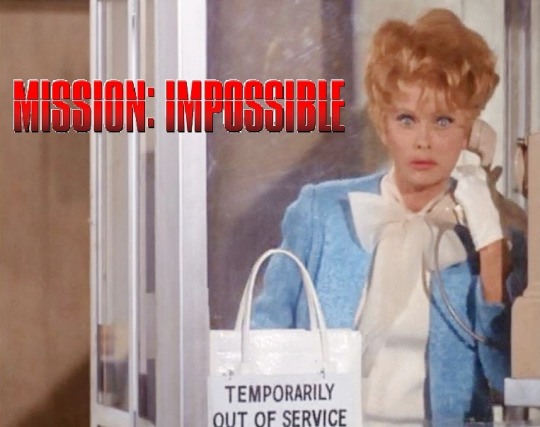
“Lucy’s Impossible Mission” (1968)
Lucy mistakenly enters a phone booth meant for a secret agent and becomes embroiled in a mission impossible. This episode is a spoof of the TV series “Mission: Impossible” (1966-73) which was a Desilu / Paramount series. Had Lucille Ball not given the nod to the series in 1966, there would be no Mission: Impossible movies today!
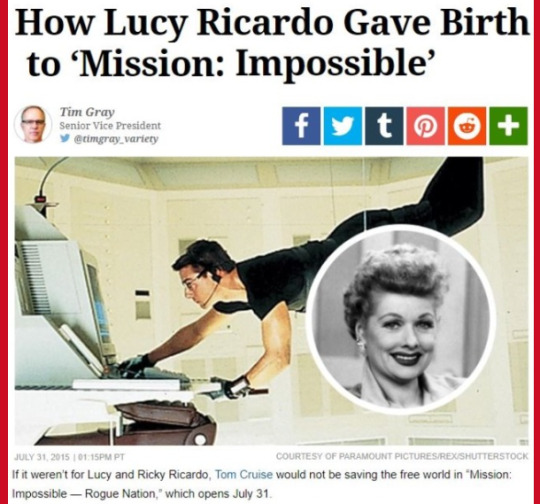
The episode uses the “Mission: Impossible” theme and original underscoring by Lalo Schifrin. The theme won a Grammy Award earlier in 1968. The instantly recognizable theme song is saved for the final chase sequence.

“Lucy and Carol Burnett” (1969)
Lucy convinces Carol Burnett to participate in a benefit to raise money for Kim and Craig’s high school gymnasium.Lucy and the kids attend a taping of “The Carol Burnett Show,” a CBS program that Lucille Ball herself had already appeared on twice as a guest star and would return to twice more. "The Carol Burnett Show” always opened with her taking questions from the studio audience, so this is recreated on “Here’s Lucy”. A new episode of “The Carol Burnett Show” aired at 10pm on the same evening this “Here’s Lucy” was first broadcast.
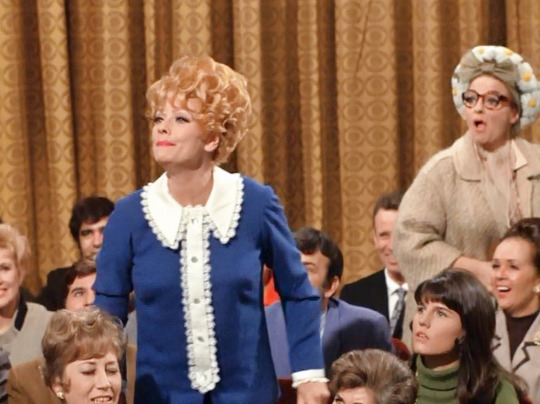
“Here’s Lucy” attempts to physically reproduce “The Carol Burnett Show” studio and stage, even using the CBS eye gold curtain. The audience section, however, is much smaller on “Here’s Lucy.”

“Lucy and Tennessee Ernie’s Fun Farm” (1969)
A farmer (Ernie Ford) wanders into the Unique Employment Agency in need of farmhands. Instead, Lucy proposes they turn his farm into a vacation spot for city folks. They start with a TV variety show and commercial to get the word out!

The commercial that Lucy and Harry do for Ernie’s Fun Farm gives us a glimpse of them as a dysfunctional married couple, complete with two typical teenage kids!

The commercial turns into a fully-staged musical revue.

“Lucy and the Used Car Salesman” (1969)
When the Carters want to become a two-car family, Kim and Craig visit a used car dealer named Cheerful Charlie (Milton Berle).
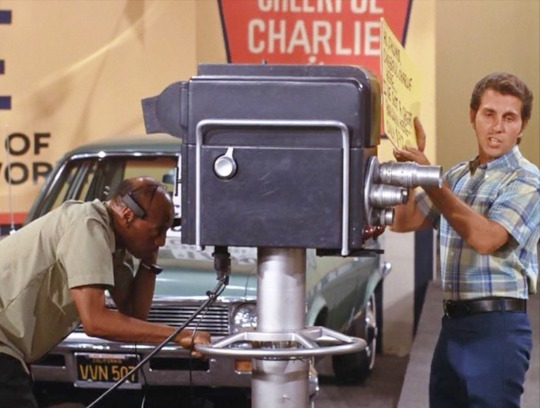
Cheerful Charlie makes his pitch using a television commercial.

In the commercial, Charlie’s chatter is chock full of alliterative chit-chat!
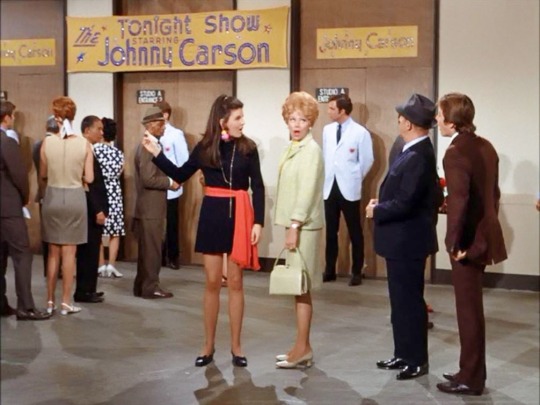
“Lucy and Johnny Carson” (1969)
When Harry takes Lucy and the kids to the filming of an educational TV show, Lucy wangles their way into “The Tonight Show” instead. Playing ‘Stump the Band’, Lucy and Harry win dinner at the Brown Derby.

From 1968 to 1980 Lucille Ball made 16 appearances on “The Tonight Show” with Johnny Carson and Ed McMahon. One appearance was just two weeks before this episode initially aired. “Here’s Lucy” recreates the stage and studio audience of “The Tonight Show”. The iconic multi-colored stage curtain is reproduced and the show’s theme music is used.
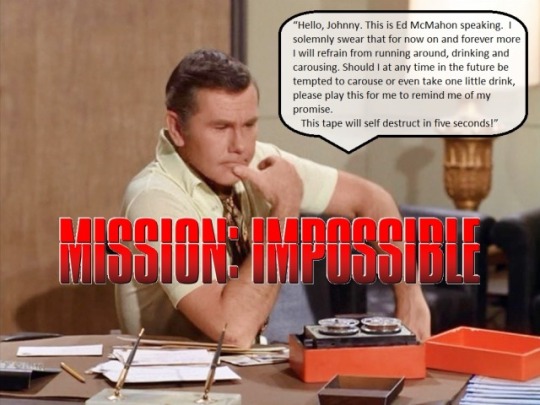
In the office, Ed leaves Johnny a box containing a small tape recorder that leaves a message vowing he will “go on the wagon”. During the playback, the “Mission: Impossible” music plays on the soundtrack. The message concludes with “This tape will self-destruct in five seconds.” This is a spoof of the TV series “Mission: Impossible”(1966-73), which was a Desilu / Paramount series.

After Craig jokes that Kim should wear three earrings, she quips “Very funny. Which one are you today? Rowan or Martin?” This is yet another of almost bi-weekly references to “Rowan and Martin’s Laugh-In,” “Here’s Lucy's” phenomenally successful competition on ABC.
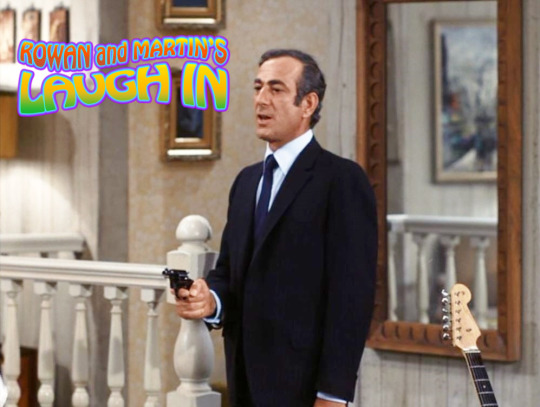
“Lucy’s Burglar Alarm” (1969)
When Lucy surrenders a measly $1.19 to the burglar (Guy Marks), he remarks “For this I had to miss ‘Laugh-In’?”
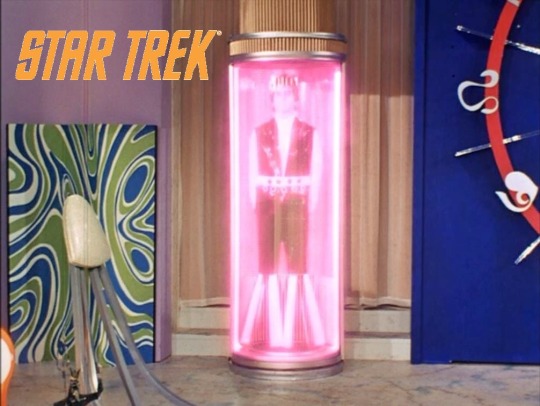
“Lucy and the Generation Gap” (1969)
Kim and Craig are in charge of producing the school play. In a nod to Desilu’s series “Star Trek” (1966-69), at the opening of the space age segment, Craig (with the help of the Desilu special effects department) materializes in a transporter tube. Beam me up, Lucy!
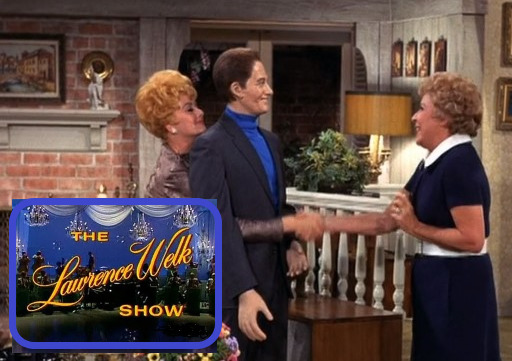
“Lucy and Lawrence Welk” (1970)
VIVIAN (To ‘Lawrence Welk’): “I watch your show every Saturday night!”
When Vivian visits, she expects Lucy to fulfill her promise to arrange a date with Lawrence Welk. Lucy doesn’t know Welk, so she borrows a wax dummy and convinces Vivian to give up her glasses. “The Lawrence Welk Show” began airing in June 1955 and had a remarkable 16 year run on ABC TV before being syndicated for a further 11 years ending in 1982. Welk was as associated with Saturday nights as Lucille Ball was with Mondays. Two days before this episode first aired (January 17, 1970) Welk’s guest was Ted Mack, legendary bandleader and talent scout.

“Lucy and Ann-Margret” (1970)
A chance meeting with Ann-Margret leads to songwriter Craig performing with her on television. On December 6, 1969, Lucille Ball guest-starred on “Ann-Margret: From Hollywood with Love” on CBS. Ball played herself and a character named Celebrity Lu, an autograph hound, opposite Autograph Annie (Ann-Margret).
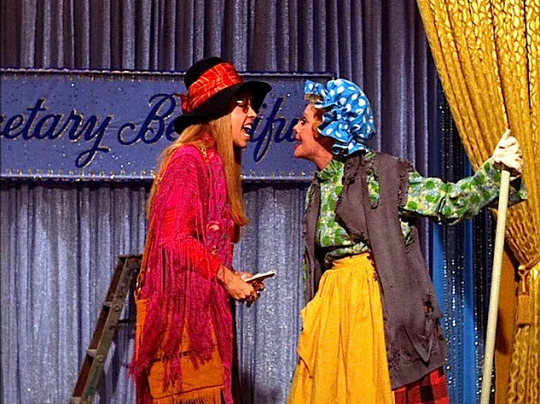
“Lucy Competes with Carol Burnett” (1970)
Lucy dresses like a charwoman identical to the character created by Burnett for her variety series “The Carol Burnett Show”. When Carol Krausmeyer (disguised as a hippie reporter) asks how Lucy Carter thought up such a goofy outfit, Lucy replies “from some goofy dame on TV.” Carol says “Well, she must be some kind of nut!”

“Lucy Loses Her Cool” (1970)
Lucy goes on "The Art Linkletter Show” and is challenged not to lose her temper for 24 hours in order to win $500. Lucy Carmichael also appeared on “The Art Linkletter Show” on “The Lucy Show.” Lucille Ball appeared on “House Party with Art Linkletter” in 1964.
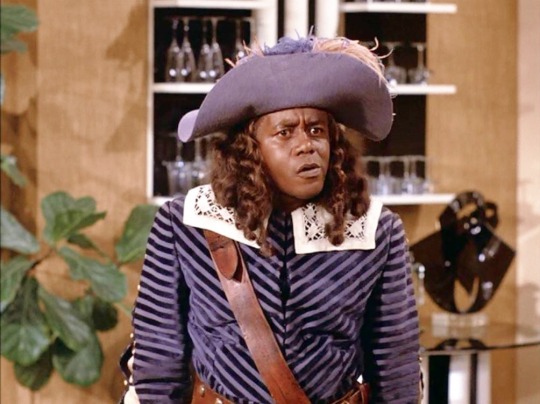
“Lucy and Flip Go Legit” (1970)
Lucy takes a temp assignment with Flip Wilson in order to answer his fan mail. Although it is never explicitly stated, Flip Wilson is preparing for his weekly television variety show “Flip” (1970-74). His most famous creation is Geraldine, a sassy woman with the catch phrase “The devil made me do it” and an unseen boyfriend named Killer. In the episode he is rehearsing a “Three Musketeers” sketch.
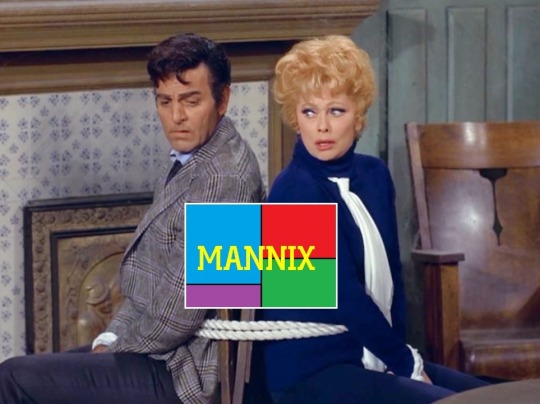
“Lucy and Mannix are Held Hostage” (1970)
Lucy happens to see three crimes in one day. Convinced thugs are after Lucy, Harry contacts his old friend, private eye Joe Mannix (Mike Connors). The private detective series “Mannix” from 1967 to 1975, which ran on CBS concurrently with “Here’s Lucy.” “Mannix” was an hour-long crime drama that was saved from the scrap heap by Lucille Ball when she was in charge of Desilu Studios. CBS planned to cancel the show after one season, but Ball used her influence to convince them to renew it with the assurance that changes would be made. In the second season, Joe Mannix was changed into a more hard-boiled independent private detective. The changes worked and the series became a big hit running for eight seasons. It was the last successful TV show to be produced by Desilu.

“Lucy and the Astronauts” (1971)
Harry takes Lucy along to a NASA splash-down, but before the astronauts can be medically cleared, Lucy has kissed them forcing Lucy and Harry to join the space travelers in isolation. Before reporting to an aircraft carrier to watch the splash-down, Lucy watches a moon walk on TV at home. Apollo 15 was launched on July 30, 1971, just a few months before this episode aired. The two-day mission sent astronauts David Scott and James Irwin to the moon.
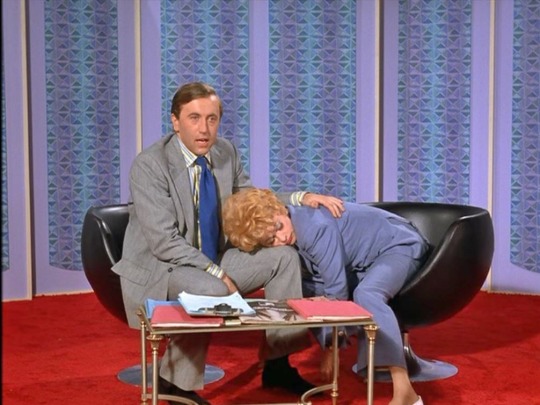
“Lucy Helps David Frost Go Night-Night” (1971)
Television host David Frost hires Lucy as his traveling companion to assure that he gets some sleep on his flight to London. When she gets to London, she is so exhausted she falls asleep on his television show. Frost hosted a US talk show “The David Frost Show” from 1969 to 1972. The evening this episode first aired “The David Frost Show” featured Frost interviewing Lauren Bacall. Starting in 1970, Lucille Ball appeared on “The David Frost Show” five times, with the fifth appearance just two weeks before this episode first aired.
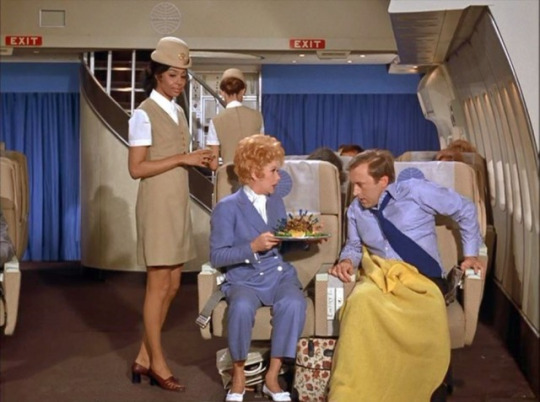
Complimenting David Frost, Lucy mentions that she saw him on “The Carol Burnett Show.” Frost appeared on the variety show in May 1971, six months before this episode first aired.
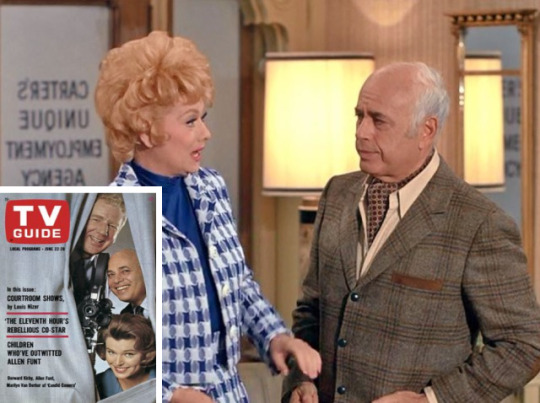
“Lucy and Candid Camera” (1971)
Allen Funt has a criminal impostor who recruits Lucy, Harry and Kim to commit robberies under the pretense that they are doing stunts for his “Candid Camera” television show. “Candid Camera” began on radio as “Candid Microphone” and moved to television in 1948. Although aired on all three major networks and in syndication, the radio program was originally aired on CBS and sponsored by Philip Morris, just like “I Love Lucy.”
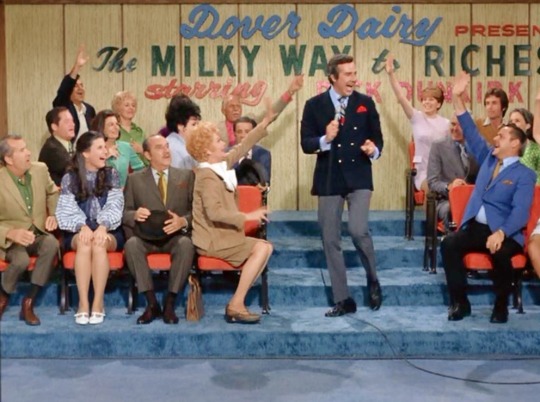
“Lucy’s Lucky Day” (1971)
To capitalize on what seems to be a lucky streak, Lucy goes on a TV game show. Dick Dunkirk (Dick Patterson) is the host of “The Milky Way to Riches” sponsored by Dover Dairy. Lucy must answer three geography questions to qualify to earn a chance to win $1,000:
DICK: Where is the lowest point in the world below sea level? LUCY: Oh, boy. I’m dead, see — ~Answer: The Dead Sea DICK: The Dead Sea is part of the border between Jordan and what other country? LUCY: Oh, boy. That question is real tough – ~ Answer: Israel DICK: It’s an autonomous region of China, bordered by China on the north and east, by India on the south and Cashmere on the West. Name this Chinese autonomous region. LUCY: And I wanted to bet I’d win. ~Answer: Tibet
After answering three questions, Lucy has to pick between three doors, just like on the TV game show “Let’s Make a Deal.” Lucy picks door #2, which is the gag prize, an untrained chimpanzee named Jackie, which she must teach to do a trick to get the money.

“Lucy and Joe Namath” (1972)
Lucy and Namath watch “The National Football League's Salute to the Quarterback” on her TV. Actual clips of Namath on the field for the New York Jets (#12) are featured.

Namath is delighted, but Lucy cringes at the physical violence. Coincidentally, “Here's Lucy's” main competition during the 1972-73 season was “Monday Night Football” on ABC. The night this episode first aired the Oakland Raiders bested the Houston Oilers 34 to 0.
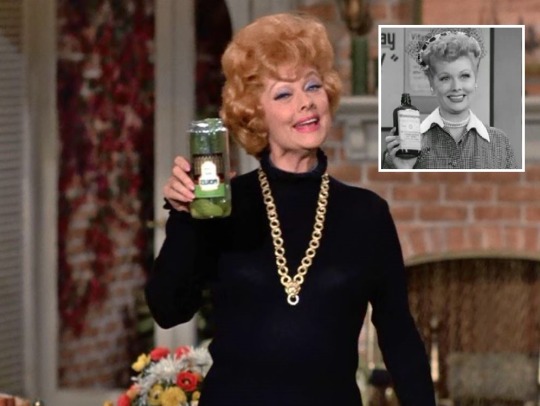
“Lucy is Really in a Pickle” (1973)
LUCY: “Thank goodness I remembered to bring Polly Parker’s Perky Pickles. Mmmm, they’re delicious! Yes, Polly Parker’s Perky Pickles make any picnic perfect. Polly’s Pickles will tickle your pallet. So next time you’re planning a picnic, pick up a pint of Polly Parker’s Perky Pickles.”
Lucy’s show business aspirations get her cast in a pickle commercial. Her alliterative pitch is foiled by the sour taste of the pickles, just like the alcohol in Vitameatavegamin was the undoing of Lucy Ricardo’s television commercial.
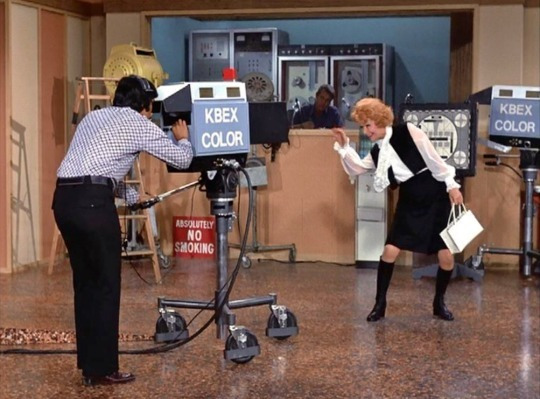
The TV camera in the studio is labeled KBEX COLOR. Similar to the way 555 is the prefix used for fictional telephone numbers, KBEX were the call letters for fictional TV and radiostations. They were used in many TV shows and films, including in Desilu’s “Mannix” and “Mission: Impossible.”

When the commercial pitch is suddenly changed to a duet song and dance number, Lucy and Kim become singing and dancing pickles - literally.

“Lucy and Chuck Connors Have a Surprise Slumber Party” (1973)
When Connors is filming a movie in Lucy’s home, Harry mentions that he is also the star of a popular television show. “Thrill Seekers” was a syndicated television series that was produced in 1973 and 1974. Hosted by Connors, it featured people who did dangerous stunts. In Lucy’s kitchen, Connors wears his orange “Thrill Seekers” jacket. The name of the show is stitched on the sleeve. Lucy tells Connors that she has seen “The Rifleman” reruns three or four times. “The Rifleman” was a Western television program starring Chuck Connors as rancher Lucas McCain.The show aired on ABC from 1958 to 1963.
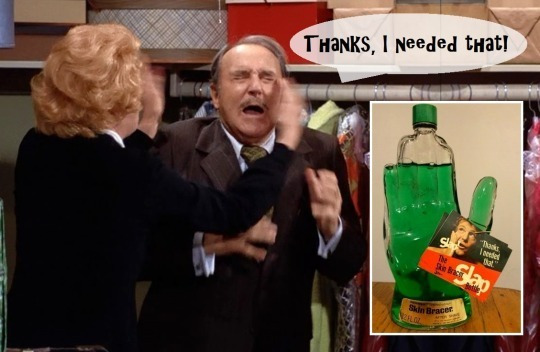
“Lucy Plays Cops and Robbers” (1973)
When Harry panics after being locked in the closet by the burglar, Lucy slaps him and he says “Thanks. I needed that.” This is a reference to a ubiquitous TV commercial for Mennen Skin Bracer Men’s Cologne. The TV ads originally starred John Goodman (“Roseann”).

“Milton Berle is the Life of the Party” (1974)
Milton Berle appears on a TV telethon auction raising money for a Day Care Center Fund. Berle offers his services as a guest at a party thrown by the highest bidder - Lucy!

“Lucy Carter Meets Lucille Ball” (1974)
A televised Lucille Ball look-alike contest is sponsored by Mais Oui Perfume. Lucy and Kim hope to win the grand prize - a sports car. The episode opens with Lucy and Kim rushing home to catch a movie on television.
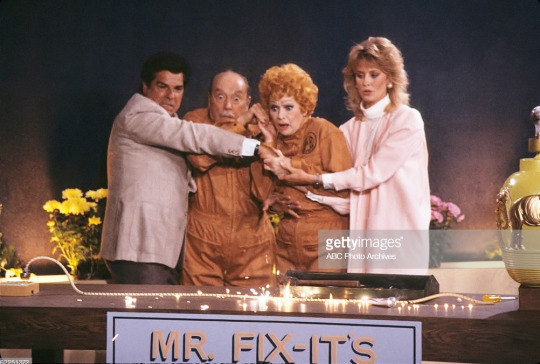
“Lucy Gets Her Wires Crossed” (1986)
With competition from other hardware stores, Lucy gets Curtis booked on a morning TV show as Mr. Fix-It. Lucy goes along as his helper and ends up gluing herself to everyone! “Wake Up Pasadena” is hosted by Fred Dunlap (Dick Gautier) and Stacy Reynolds (D.D. Howard).
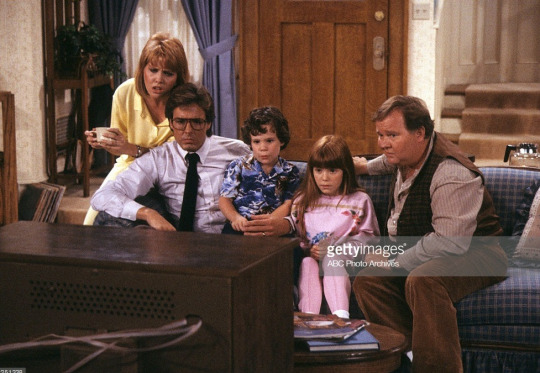
LUCY (to Curtis): “Let grandma be on television!”
[Photos of “Life with Lucy” property of Getty Images]
#Television#TV#Lucille Ball#Here's Lucy#Life With Lucy#Gale Gordon#Lucie Arnaz#Desi arnaz Jr.#Jackie Gleason#Carol Burnett#Tennessee Ernie Ford#Johnny Carson#Ann-Margret#Lawrence Welk#David Frost#Flip Wilson#Allen Funt#Joe Namath#Chuck Connors#Mike Connors
6 notes
·
View notes
Text
If you were asked to guess which prestigious film-making duo had spent their career scratching around desperately for cash, trying to wriggle out of paying their cast and crew, ping-ponging between lovers, and having such blood-curdling bust-ups that their neighbours called the police, it might be some time before “Merchant Ivory” sprang to mind. But a new warts-and-all documentary about the Indian producer Ismail Merchant and the US director James Ivory makes it clear that the simmering passions in their films, such as the EM Forster trilogy of A Room With a View, Maurice and Howards End, were nothing compared to the scalding, volatile ones behind the camera.
From their initial meeting in New York in 1961 to Merchant’s death during surgery in 2005, the pair were as inseparable as their brand name, with its absence of any hyphen or ampersand, might suggest. Their output was always more eclectic than they got credit for. They began with a clutch of insightful Indian-set dramas including Shakespeare-Wallah, their 1965 study of a troupe of travelling actors, featuring a young, pixieish Felicity Kendal. From there, they moved on to Savages, a satire on civilisation and primitivism, and The Wild Party, a skewering of 1920s Hollywood excess that pipped Damien Chazelle’s Babylon to the post by nearly half a century.
It was in the 1980s and early 1990s, though, that Merchant Ivory became box-office titans, cornering the market in plush dramas about repressed Brits in period dress. Those literary adaptations launched the careers of Hugh Grant, Helena Bonham Carter, Rupert Graves and Julian Sands, and helped make stars of Emma Thompson and Daniel Day-Lewis. Most were scripted by Ruth Prawer Jhabvala, who had been with them, on and off, since their 1963 debut The Householder; she even lived in the same apartment building in midtown New York. Many were scored by Richard Robbins, who was romantically involved with Merchant while also holding a candle for Bonham Carter. These films restored the costume drama to the position it had occupied during David Lean’s heyday. The roaring trade in Jane Austen adaptations might never have happened without them. You could even blame Merchant Ivory for Bridgerton.
Though the pictures were uniformly pretty, making them was often ugly. Money was always scarce. Asked where he would find the cash for the next movie, Merchant replied: “Wherever it is now.” After Jenny Beavan and John Bright won an Academy Award for the costumes in A Room With a View, he said:“I got you your Oscar. Why do I need to pay you?” As Ivory was painstakingly composing each shot, Merchant’s familiar, booming battle cry would ring out: “Shoot, Jim, shoot!”
Heat and Dust, starring Julie Christie, was especially fraught. Only 30 or 40% of the budget was in place by the time the cameras started rolling in India in 1982; Merchant would rise at dawn to steal the telegrams from the actors’ hotels so they didn’t know their agents were urging them to down tools. Interviewees in the documentary concede that the producer was a “conman” with a “bazaar mentality”. But he was also an incorrigible charmer who dispensed flattery by the bucketload, threw lavish picnics, and wangled entrées to magnificent temples and palaces. “You never went to bed without dreaming of ways to kill him,” says one friend, the journalist Anna Kythreotis. “But you couldn’t not love him.”
Stephen Soucy, who directed the documentary, doesn’t soft-pedal how wretched those sets could be. “Every film was a struggle,” he tells me. “People were not having a good time. Thompson had a huge fight with Ismail on Howards End because she’d been working for 13 days in a row, and he tried to cancel her weekend off. Gwyneth Paltrow hated every minute of making Jefferson in Paris. Hated it! Laura Linney was miserable on The City of Your Final Destination because the whole thing was a shitshow. But you watch the films and you see no sense of that.”
Soucy’s movie features archive TV clips of the duo bickering even in the midst of promoting a film. “Oh, they were authentic all right,” he says. “They clashed a lot.”The authenticity extended to their sexuality. The subject was not discussed publicly until after Ivory won an Oscar for writing Call Me By Your Name: “You have to remember that Ismail was an Indian citizen living in Bombay, with a deeply conservative Muslim family,” Ivory told me in 2018. But the pair were open to those who knew them. “I never had a sense of guilt,” Ivory says, pointing out that the crew on The Householder referred to him and Merchant as “Jack and Jill”.
Soucy had already begun filming his documentary when Ivory published a frank, fragmentary memoir, Solid Ivory, which dwells in phallocentric detail on his lovers before and during his relationship with Merchant, including the novelist Bruce Chatwin. It was that book which emboldened Soucy to ask questions on screen – including about “the crazy, complicated triangle of Jim, Ismail and Dick [Robbins]” – that he might not otherwise have broached.
The documentary is most valuable, though, in making a case for Ivory as an underrated advocate for gay representation. The Remains of the Day, adapted from Kazuo Ishiguro’s Booker-winning novel about a repressed butler, may be the duo’s masterpiece, but it was their gay love story Maurice that was their riskiest undertaking. Set in the early 20th century, its release in 1987 could scarcely have been timelier: it was the height of the Aids crisis, and only a few months before the Conservative government’s homophobic Section 28 became law.
“Ismail wasn’t as driven as Jim to make Maurice,” explains Soucy. “And Ruth was too busy to write it. But Jim’s dogged determination won the day. They’d had this global blockbuster with A Room With a View, and he knew it could be now or never. People would pull aside Paul Bradley, the associate producer, and say: ‘Why are they doing Maurice when they could be making anything?’ I give Jim so much credit for having the vision and tenacity to make sure the film got made.”
Merchant Ivory don’t usually figure in surveys of queer cinema, though they are part of its ecosystem, and not only because of Maurice. Ron Peck, who made the gay classic Nighthawks, was a crew member on The Bostonians. Andrew Haigh, director of All of Us Strangers, landed his first industry job as a poorly paid assistant in Merchant’s Soho office in the late 1990s; in Haigh’s 2011 breakthrough film Weekend, one character admits to freeze-framing the naked swimming scene in A Room With a View to enjoy “Rupert Graves’s juddering cock”. Merchant even offered a role in Savages to Holly Woodlawn, the transgender star of Andy Warhol’s Trash, only for her to decline because the fee was so low.
The position of Merchant Ivory at the pinnacle of British cinema couldn’t last for ever. Following the success of The Remains of the Day, which was nominated for eight Oscars, the brand faltered and fizzled. Their films had already been dismissed by the director Alan Parker as representing “the Laura Ashley school” of cinema. Gary Sinyor spoofed their oeuvre in the splendid pastiche Stiff Upper Lips (originally titled Period!), while Eric Idle was plotting his own send-up called The Remains of the Piano. The culture had moved on.
There was still an appetite for upper-middle-class British repression, but only if it was funny: Richard Curtis drew on some of Merchant Ivory’s repertory company of actors (Grant, Thompson, Simon Callow) for a run of hits beginning with Four Weddings and a Funeral, which took the poshos out of period dress and plonked them into romcoms.
The team itself was splintering. Merchant had begun directing his own projects. When he and Ivory did collaborate, the results were often unwieldy, lacking the stabilising literary foundation of their best work. “Films like Jefferson in Paris and Surviving Picasso didn’t come from these character-driven novels like Forster, James or Ishiguro,” notes Soucy. “Jefferson and Picasso were not figures that audiences warmed to.” Four years after Merchant’s death, Ivory’s solo project The City of Your Final Destination became mired in lawsuits, including one from Anthony Hopkins for unpaid earnings.
Soucy’s film, though, is a reminder of their glory days. It may also stoke interest in the movies among young queer audiences whose only connection to Ivory, now 95, is through Call Me By Your Name. “People walk up to Jim in the street to shake his hand and thank him for Maurice,” says Soucy. “But I also wanted to include the more dysfunctional side of how they were made. Hopefully it will be inspiring to young film-makers to see that great work can come out of chaos.”
11 notes
·
View notes
Text
HARARE, Zimbabwe -- Zimbabwean President Emmerson Mnangagwa on Monday hailed recent elections as a sign of the country’s “mature democracy” and a victory over Western adversaries, as he took an oath of office following a vote whose credibility was questioned by both Western and African observers.
Mnangagwa, 80, won disputed polls held on Aug. 26, garnering 52.6% of the vote ahead of main opposition leader Nelson Chamisa’s 44%. His ZANU-PF party, which has ruled the tiny nation of 15 million people since independence from white minority rule in 1980, also retained a parliamentary majority.
“There are no losers but victory for the people of Zimbabwe against the neo-colonial tendencies of our country’s detractors and those who believe that might is right. … We have shamed our detractors,” he said before jubilant supporters, many of them bussed to pack a 60,000-seater Chinese-built stadium in the capital, Harare.
“Counter revolutionaries and their proxies will never prevail in Zimbabwe,” said Mnangagwa, who routinely accuses the opposition of being puppets of the U.S and other Western nations that placed sanctions on the country two decades ago over alleged human rights violations.
The elections are the second since the ouster of longtime autocratic ruler Robert Mugabe in a 2017 coup. Mnangagwa, a close Mugabe ally for years, became president following the coup. He undertook to thaw icy relations with the West after taking power.
He even applied for Zimbabwe to rejoin the Commonwealth, a bloc of mainly former British colonies that Zimbabwe left in 2003 after it became apparent that the organization would extend a suspension imposed a year earlier following elections marred by allegations of violence and rigging.
But criticism over his rule by the West has seen Mnangagwa strengthening ties with traditional Mugabe allies such as China and Russia. He hosted Iran’s president Ebrahim Raisi in July, months after a visit by Belarusian President Alexander Lukashenko, and talked up coalitions against U.S sanctions.
Mnangagwa also won disputed presidential elections against Chamisa in 2018. The country’s constitutional court rejected Chamisa’s challenge of the election result.
The 45-year-old opposition leader did not approach the court this time despite describing the poll as a “blatant and gigantic fraud” and calling for fresh elections supervised by the country’s neighbors.
Observers from regional blocs the Southern African Development Community and African Union as well as the Carter Center and the European Union said that although voting day was largely peaceful, an atmosphere of intimidation had characterized the runup to the polls.
Mnangagwa did not directly address Chamisa’s concerns or those of the observers during Monday’s speech, but he described the elections as “peaceful, free, fair, transparent and credible” and criticized Western sanctions as “illegal” and “heinous.”
Credible elections were viewed by many as a key step toward ending Zimbabwe’s international isolation and setting the stage for the recovery of a once prosperous economy in a country with rich agricultural land and vast mineral resources.
Zimbabwe has Africa’s largest deposits of the highly sought-after battery mineral lithium that has attracted interest from China.
Mnangagwa in his inauguration speech promised to use the country’s minerals that include gold and diamonds to drive economic growth. He touted developments in roads and dam construction and a rebound in the agricultural sector as evidence of his record.
A carnival atmosphere engulfed the stadium, with thousands dressed in the ruling party’s green, yellow and red colors dancing to live music. Helicopters and planes from the country’s air force flew in formation and neatly dressed security forces slow marched, among other displays that included a 21-gun salute. The presidents of Mozambique, South Africa and Congo attended the event.
But the situation was muted in much of the capital, Harare, an opposition stronghold where street vendors teemed the streets. About two thirds of the country’s working age population survives on informal trade such as street hawking after the collapse of many formal industries over the past two decades, according to the International Monetary Fund.
Mnangagwa promised a new era of freedom, democracy and economic prosperity after replacing Mugabe, yet many say they don’t see much change.
“There is nothing to celebrate, it’s going to be another five years of suffering and repression,” said Onismo Mweda, pushing a cart from where he sold fruits and vegetables in the capital’s central business district.
2 notes
·
View notes
Photo

“One-sheet poster for Raging Bull, 1980 Robert De Niro Papers osf 58 De Niro was given a copy of the book Raging Bull, My Story by Jake La Motta (with Joseph Carter and Peter Savage) while he was in Italy working on The Godfather, Part II. De Niro found the story full of cinematic possibilities but could not persuade Scorsese to direct. De Niro began to develop the project himself. In 1976 De Niro asked producers Robert Chartoff and Irwin Winkler - who had recently finished production on Rocky - to consider working with him on the project. Intrigued by the story and wanting to continue their creative collaboration with De Niro and Scorsese, the two agreed to produce. Scorsese, however, was focused on developing The Last Temptation of Christ, which Chartoff and Winkler had also agreed to produce, and again declined to direct. In 1978, Scorsese collapsed from exhaustion during the Telluride Film Festival. De Niro's conversations with Scorsese during his recovery resulted in Scorsese's growing enthusiasm for Raging Bull. Winkler and Chartoff had been disappointed with previous versions of the screenplay but were encouraged by Paul Schrader's draft, which they felt was vastly improved but "cold." Winkler encouraged Scorsese and De Niro to write one themselves based on Schrader's work and LaMotta's book. After four weeks of intense work the two produced a draft that impressed everyone. De Niro studied every detail about the character; did background research on boxing, watching countless bouts on videotape; and trained for months with Jake LaMotta himself. Scorsese cast Joe Pesci as Joey after seeing him in an independent film The Death Collector (1976), and Pesci in turn recommended Cathy Moriarty for the part of Jake's wife, Vicky. Initial reviews of Raging Bull were mixed due to the brutality both in and outside the ring, but the film ultimately received eight Academy Award nominations. Thelma Schoonmaker won for editing and Robert De Niro for Best Actor. In 1990, the Library of Congress added Raging Bull to the National Film Registry for being "culturally, historically, and aesthetically significant.”
#robert de niro#robert de niro archives#robert de niro hrc#hrc archives#harry ransom center#ut austin#films#film history#posters
3 notes
·
View notes